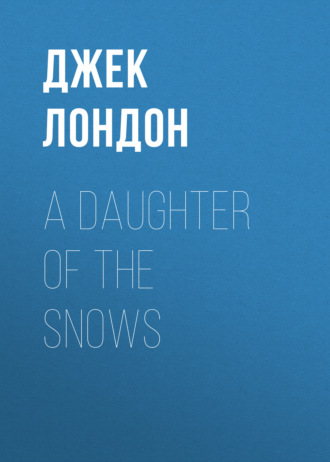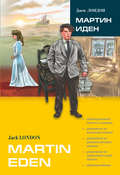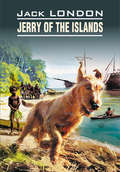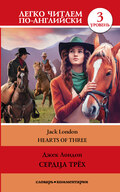
Джек Лондон
A Daughter of the Snows
CHAPTER XVII
"Tired?"
Jacob Welse put both hands on Frona's shoulders, and his eyes spoke the love his stiff tongue could not compass. The tree and the excitement and the pleasure were over with, a score or so of children had gone home frostily happy across the snow, the last guest had departed, and Christmas Eve and Christmas Day were blending into one.
She returned his fondness with glad-eyed interest, and they dropped into huge comfortable chairs on either side the fireplace, in which the back-log was falling to ruddy ruin.
"And this time next year?" He put the question seemingly to the glowing log, and, as if in ominous foreshadow, it flared brightly and crumbled away in a burst of sparks.
"It is marvellous," he went on, dismissing the future in an effort to shake himself into a wholesomer frame of mind. "It has been one long continuous miracle, the last few months, since you have been with me. We have seen very little of each other, you know, since your childhood, and when I think upon it soberly it is hard to realize that you are really mine, sprung from me, bone of my bone and flesh of my flesh. As the tangle-haired wild young creature of Dyea, – a healthy, little, natural animal and nothing more, – it required no imagination to accept you as one of the breed of Welse. But as Frona, the woman, as you were to-night, as you are now as I look at you, as you have been since you came down the Yukon, it is hard.. I cannot realize.. I." He faltered and threw up his hands helplessly. "I almost wish that I had given you no education, that I had kept you with me, faring with me, adventuring with me, achieving with me, and failing with me. I would have known you, now, as we sit by the fire. As it is, I do not. To that which I did know there has been added, somehow (what shall I call it?), a subtlety; complexity, – favorite words of yours, – which is beyond me.
"No." He waved the speech abruptly from her lips. She came over and knelt at his feet, resting her head on his knee and clasping his hand in firm sympathy. "No, that is not true. Those are not the words. I cannot find them. I fail to say what I feel. Let me try again. Underneath all you do carry the stamp of the breed. I knew I risked the loss of that when I sent you away, but I had faith in the persistence of the blood and I took the chance; doubted and feared when you were gone; waited and prayed dumbly, and hoped oftentimes hopelessly; and then the day dawned, the day of days! When they said your boat was coming, death rose and walked on the one hand of me, and on the other life everlasting. Made or marred; made or marred, – the words rang through my brain till they maddened me. Would the Welse remain the Welse? Would the blood persist? Would the young shoot rise straight and tall and strong, green with sap and fresh and vigorous? Or would it droop limp and lifeless, withered by the heats of the world other than the little simple, natural Dyea world?
"It was the day of days, and yet it was a lingering, watching, waiting tragedy. You know I had lived the years lonely, fought the lone fight, and you, away, the only kin. If it had failed.. But your boat shot from the bluffs into the open, and I was half-afraid to look. Men have never called me coward, but I was nearer the coward then than ever and all before. Ay, that moment I had faced death easier. And it was foolish, absurd. How could I know whether it was for good or ill when you drifted a distant speck on the river? Still, I looked, and the miracle began, for I did know. You stood at the steering-sweep. You were a Welse. It seems so little; in truth it meant so much. It was not to be expected of a mere woman, but of a Welse, yes. And when Bishop went over the side, and you gripped the situation as imperatively as the sweep, and your voice rang out, and the Siwashes bent their backs to your will, – then was it the day of days."
"I tried always, and remembered," Frona whispered. She crept up softly till her arm was about his neck and her head against his breast. He rested one arm lightly on her body, and poured her bright hair again and again from his hand in glistening waves.
"As I said, the stamp of the breed was unmarred, but there was yet a difference. There is a difference. I have watched it, studied it, tried to make it out. I have sat at table, proud by the side of you, but dwarfed. When you talked of little things I was large enough to follow; when of big things, too small. I knew you, had my hand on you, when presto! and you were away, gone – I was lost. He is a fool who knows not his own ignorance; I was wise enough to know mine. Art, poetry, music, – what do I know of them? And they were the great things, are the great things to you, mean more to you than the little things I may comprehend. And I had hoped, blindly, foolishly, that we might be one in the spirit as well as the one flesh. It has been bitter, but I have faced it, and understand. But to see my own red blood get away from me, elude me, rise above me! It stuns. God! I have heard you read from your Browning – no, no; do not speak – and watched the play of your face, the uplift and the passion of it, and all the while the words droning in upon me, meaningless, musical, maddening. And Mrs. Schoville sitting there, nursing an expression of idiotic ecstasy, and understanding no more than I. I could have strangled her.
"Why, I have stolen away, at night, with your Browning, and locked myself in like a thief in fear. The text was senseless, I have beaten my head with my fist like a wild man, to try and knock some comprehension into it. For my life had worked itself out along one set groove, deep and narrow. I was in the rut. I had done those things which came to my hand and done them well; but the time was past; I could not turn my hand anew. I, who am strong and dominant, who have played large with destiny, who could buy body and soul a thousand painters and versifiers, was baffled by a few paltry cents' worth of printed paper!"
He spilled her hair for a moment's silence.
"To come back. I had attempted the impossible, gambled against the inevitable. I had sent you from me to get that which I had not, dreaming that we would still be one. As though two could be added to two and still remain two. So, to sum up, the breed still holds, but you have learned an alien tongue. When you speak it I am deaf. And bitterest of all, I know that the new tongue is the greater. I do not know why I have said all this, made my confession of weakness – "
"Oh, father mine, greatest of men!" She raised her head and laughed into his eyes, the while brushing back the thick iron-gray hair which thatched the dome of his forehead. "You, who have wrestled more mightily, done greater things than these painters and versifiers. You who know so well the law of change. Might not the same plaint fall from your father's lips were he to sit now beside you and look upon your work and you?"
"Yes, yes. I have said that I understand. Do not let us discuss it.. a moment's weakness. My father was a great man."
"And so mine."
"A struggler to the end of his days. He fought the great lone fight – "
"And so mine."
"And died fighting."
"And so shall mine. So shall we all, we Welses."
He shook her playfully, in token of returning spirits. "But I intend to sell out, – mines, Company, everything, – and study Browning."
"Still the fight. You can't discount the blood, father."
"Why were you not a boy?" he demanded, abruptly. "You would have been a splendid one. As it is, a woman, made to be the delight of some man, you must pass from me – to-morrow, next day, this time next year, who knows how soon? Ah? now I know the direction my thought has been trending. Just as I know you do, so do I recognize the inevitableness of it and the justness. But the man, Frona, the man?"
"Don't," she demurred. "Tell me of your father's fight, the last fight, the great lone fight at Treasure City. Ten to one it was, and well fought. Tell me."
"No, Frona. Do you realize that for the first time in our lives we talk together seriously, as father and daughter, – for the first time? You have had no mother to advise; no father, for I trusted the blood, and wisely, and let you go. But there comes a time when the mother's counsel is needed, and you, you who never knew one?"
Frona yielded, in instant recognition, and waiting, snuggled more closely to him.
"This man, St. Vincent – how is it between you?"
"I.. I do not know. How do you mean?"
"Remember always, Frona, that you have free choice, yours is the last word. Still, I would like to understand. I could.. perhaps.. I might be able to suggest. But nothing more. Still, a suggestion."
There was something inexpressibly sacred about it, yet she found herself tongue-tied. Instead of the one definite thing to say, a muddle of ideas fluttered in her brain. After all, could he understand? Was there not a difference which prevented him from comprehending the motives which, for her, were impelling? For all her harking back to the primitive and stout defence of its sanity and truth, did his native philosophy give him the same code which she drew from her acquired philosophy? Then she stood aside and regarded herself and the queries she put, and drew apart from them, for they breathed of treason.
"There is nothing between us, father," she spoke up resolutely. "Mr. St. Vincent has said nothing, nothing. We are good friends, we like each other, we are very good friends. I think that is all."
"But you like each other; you like him. Is it in the way a woman must like a man before she can honestly share her life with him, lose herself in him? Do you feel with Ruth, so that when the time comes you can say, 'Thy people are my people, and thy God my God'?"
"N – o. It may be; but I cannot, dare not face it, say it or not say it, think it or not think it – now. It is the great affirmation. When it comes it must come, no one may know how or why, in a great white flash, like a revelation, hiding nothing, revealing everything in dazzling, blinding truth. At least I so imagine."
Jacob Welse nodded his head with the slow meditation of one who understands, yet stops to ponder and weigh again.
"But why have you asked, father? Why has Mr. St. Vincent been raised?
I have been friends with other men."
"But I have not felt about other men as I do of St. Vincent. We may be truthful, you and I, and forgive the pain we give each other. My opinion counts for no more than another's. Fallibility is the commonest of curses. Nor can I explain why I feel as I do – I oppose much in the way you expect to when your great white flash sears your eyes. But, in a word, I do not like St. Vincent."
"A very common judgment of him among the men," Frona interposed, driven irresistibly to the defensive.
"Such consensus of opinion only makes my position stronger," he returned, but not disputatively. "Yet I must remember that I look upon him as men look. His popularity with women must proceed from the fact that women look differently than men, just as women do differ physically and spiritually from men. It is deep, too deep for me to explain. I but follow my nature and try to be just."
"But have you nothing more definite?" she asked, groping for better comprehension of his attitude. "Can you not put into some sort of coherence some one certain thing of the things you feel?"
"I hardly dare. Intuitions can rarely be expressed in terms of thought. But let me try. We Welses have never known a coward. And where cowardice is, nothing can endure. It is like building on sand, or like a vile disease which rots and rots and we know not when it may break forth."
"But it seems to me that Mr. St. Vincent is the last man in the world with whom cowardice may be associated. I cannot conceive of him in that light."
The distress in her face hurt him. "I know nothing against St. Vincent. There is no evidence to show that he is anything but what he appears. Still, I cannot help feeling it, in my fallible human way. Yet there is one thing I have heard, a sordid pot-house brawl in the Opera House. Mind you, Frona, I say nothing against the brawl or the place, – men are men, but it is said that he did not act as a man ought that night."
"But as you say, father, men are men. We would like to have them other than they are, for the world surely would be better; but we must take them as they are. Lucile – "
"No, no; you misunderstand. I did not refer to her, but to the fight.
He did not.. he was cowardly."
"But as you say, it is said. He told me about it, not long afterwards, and I do not think he would have dared had there been anything – "
"But I do not make it as a charge," Jacob Welse hastily broke in. "Merely hearsay, and the prejudice of the men would be sufficient to account for the tale. And it has no bearing, anyway. I should not have brought it up, for I have known good men funk in my time – buck fever, as it were. And now let us dismiss it all from our minds. I merely wished to suggest, and I suppose I have bungled. But understand this, Frona," turning her face up to his, "understand above all things and in spite of them, first, last, and always, that you are my daughter, and that I believe your life is sacredly yours, not mine, yours to deal with and to make or mar. Your life is yours to live, and in so far that I influence it you will not have lived your life, nor would your life have been yours. Nor would you have been a Welse, for there was never a Welse yet who suffered dictation. They died first, or went away to pioneer on the edge of things.
"Why, if you thought the dance house the proper or natural medium for self-expression, I might be sad, but to-morrow I would sanction your going down to the Opera House. It would be unwise to stop you, and, further, it is not our way. The Welses have ever stood by, in many a lost cause and forlorn hope, knee to knee and shoulder to shoulder. Conventions are worthless for such as we. They are for the swine who without them would wallow deeper. The weak must obey or be crushed; not so with the strong. The mass is nothing; the individual everything; and it is the individual, always, that rules the mass and gives the law. A fig for what the world says! If the Welse should procreate a bastard line this day, it would be the way of the Welse, and you would be a daughter of the Welse, and in the face of hell and heaven, of God himself, we would stand together, we of the one blood, Frona, you and I."
"You are larger than I," she whispered, kissing his forehead, and the caress of her lips seemed to him the soft impact of a leaf falling through the still autumn air.
And as the heat of the room ebbed away, he told of her foremother and of his, and of the sturdy Welse who fought the great lone fight, and died, fighting, at Treasure City.
CHAPTER XVIII
The "Doll's House" was a success. Mrs. Schoville ecstasized over it in terms so immeasurable, so unqualifiable, that Jacob Welse, standing near, bent a glittering gaze upon her plump white throat and unconsciously clutched and closed his hand on an invisible windpipe. Dave Harney proclaimed its excellence effusively, though he questioned the soundness of Nora's philosophy and swore by his Puritan gods that Torvald was the longest-eared Jack in two hemispheres. Even Miss Mortimer, antagonistic as she was to the whole school, conceded that the players had redeemed it; while Matt McCarthy announced that he didn't blame Nora darlin' the least bit, though he told the Gold Commissioner privately that a song or so and a skirt dance wouldn't have hurt the performance.
"Iv course the Nora girl was right," he insisted to Harney, both of whom were walking on the heels of Frona and St. Vincent. "I'd be seein' – "
"Rubber – "
"Rubber yer gran'mother!" Matt wrathfully exclaimed.
"Ez I was sayin'," Harney continued, imperturbably, "rubber boots is goin' to go sky-high 'bout the time of wash-up. Three ounces the pair, an' you kin put your chips on that for a high card. You kin gather 'em in now for an ounce a pair and clear two on the deal. A cinch, Matt, a dead open an' shut."
"The devil take you an' yer cinches! It's Nora darlin' I have in me mind the while."
They bade good-by to Frona and St. Vincent and went off disputing under the stars in the direction of the Opera House.
Gregory St. Vincent heaved an audible sigh. "At last."
"At last what?" Frona asked, incuriously.
"At last the first opportunity for me to tell you how well you did. You carried off the final scene wonderfully; so well that it seemed you were really passing out of my life forever."
"What a misfortune!"
"It was terrible."
"No."
"But, yes. I took the whole condition upon myself. You were not Nora, you were Frona; nor I Torvald, but Gregory. When you made your exit, capped and jacketed and travelling-bag in hand, it seemed I could not possibly stay and finish my lines. And when the door slammed and you were gone, the only thing that saved me was the curtain. It brought me to myself, or else I would have rushed after you in the face of the audience."
"It is strange how a simulated part may react upon one," Frona speculated.
"Or rather?" St. Vincent suggested.
Frona made no answer, and they walked on without speech. She was still under the spell of the evening, and the exaltation which had come to her as Nora had not yet departed. Besides, she read between the lines of St. Vincent's conversation, and was oppressed by the timidity which comes over woman when she faces man on the verge of the greater intimacy.
It was a clear, cold night, not over-cold, – not more than forty below, – and the land was bathed in a soft, diffused flood of light which found its source not in the stars, nor yet in the moon, which was somewhere over on the other side of the world. From the south-east to the northwest a pale-greenish glow fringed the rim of the heavens, and it was from this the dim radiance was exhaled.
Suddenly, like the ray of a search-light, a band of white light ploughed overhead. Night turned to ghostly day on the instant, then blacker night descended. But to the southeast a noiseless commotion was apparent. The glowing greenish gauze was in a ferment, bubbling, uprearing, downfalling, and tentatively thrusting huge bodiless hands into the upper ether. Once more a cyclopean rocket twisted its fiery way across the sky, from horizon to zenith, and on, and on, in tremendous flight, to horizon again. But the span could not hold, and in its wake the black night brooded. And yet again, broader, stronger, deeper, lavishly spilling streamers to right and left, it flaunted the midmost zenith with its gorgeous flare, and passed on and down to the further edge of the world. Heaven was bridged at last, and the bridge endured!
At this flaming triumph the silence of earth was broken, and ten thousand wolf-dogs, in long-drawn unisoned howls, sobbed their dismay and grief. Frona shivered, and St. Vincent passed his arm about her waist. The woman in her was aware of the touch of man, and of a slight tingling thrill of vague delight; but she made no resistance. And as the wolf-dogs mourned at her feet and the aurora wantoned overhead, she felt herself drawn against him closely.
"Need I tell my story?" he whispered.
She drooped her head in tired content on his shoulder, and together they watched the burning vault wherein the stars dimmed and vanished. Ebbing, flowing, pulsing to some tremendous rhythm, the prism colors hurled themselves in luminous deluge across the firmament. Then the canopy of heaven became a mighty loom, wherein imperial purple and deep sea-green blended, wove, and interwove, with blazing woof and flashing warp, till the most delicate of tulles, fluorescent and bewildering, was daintily and airily shaken in the face of the astonished night.
Without warning the span was sundered by an arrogant arm of black. The arch dissolved in blushing confusion. Chasms of blackness yawned, grew, and rushed together. Broken masses of strayed color and fading fire stole timidly towards the sky-line. Then the dome of night towered imponderable, immense, and the stars came back one by one, and the wolf-dogs mourned anew.
"I can offer you so little, dear," the man said with a slightly perceptible bitterness. "The precarious fortunes of a gypsy wanderer."
And the woman, placing his hand and pressing it against her heart, said, as a great woman had said before her, "A tent and a crust of bread with you, Richard."






